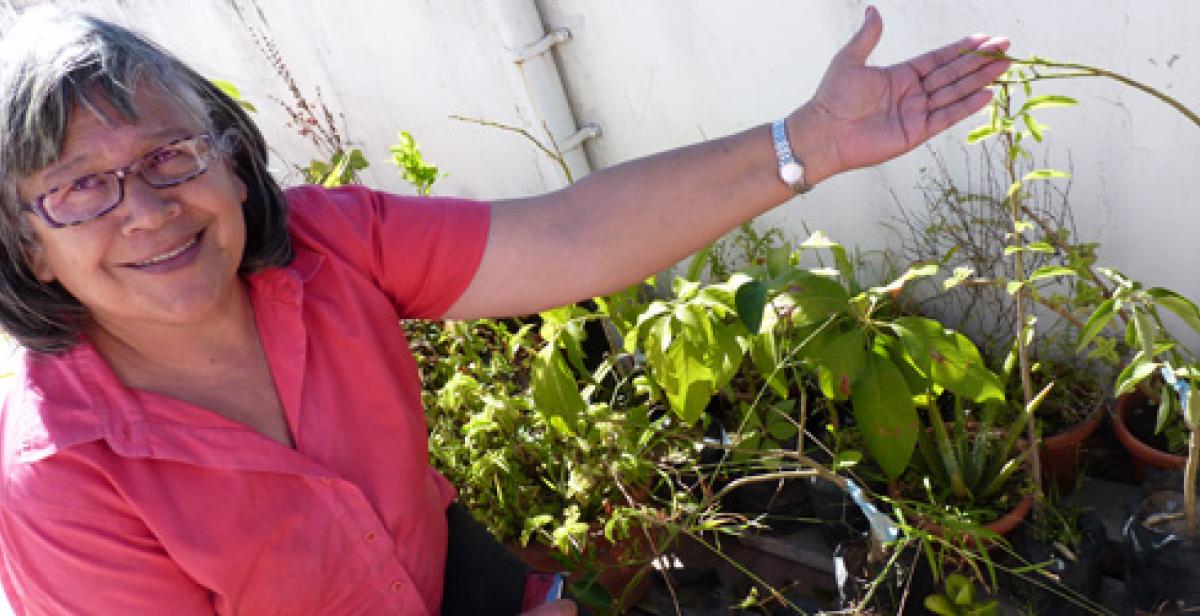Water is precious in Tegucigalpa, the Honduran capital, as drought takes its toll on the amounts of water available to local people. Water rationing is becoming more frequent and severe year on year. In a country of gaping inequalities, it is the poorest who bear the brunt of scarcity and who need most help to cope with erratic weather.
Maritza Arevalo, 58, says God has given her wisdom to make the most out of the few things she has. She lives in a poor neighbourhood in Tegucigalpa. It is an overpopulated area with serious water shortages and little room to live. It’s an unlikely place to set yourself up as a farmer.
Yet Maritza, a single mother of five, has turned her small yard into a vegetable garden. And rather than relying on a decreasing public water supply, she built a water harvesting tank to collect rainwater and grow vegetables for her children. She manages to feed her family and cushion the blow climate change has on their lives.

Maritza and her fellow compañeras of the Mother Earth Movement have trained other ‘urban farmers’ in Tegucigalpa on how to build and use the system they’ve developed to collect and recycle water. So far they have built around 200 tanks.
“Rainwater harvesting is currently a pressing need,” says Maritza. Last year, water shortages from drought associated with the climatic phenomenon ‘El Niño’ already led the government to declare a state of emergency in the Honduran capital. And the ‘El Niño’ phenomenon is set to become stronger and more recurrent as the planet warms.
But the water rationing in effect in Tegucigalpa all year round doesn’t affect everyone the same. In a city sleeps 20-30% of the country’s population, it’s the poor neighbourhoods that are hit the most.
“In our households, we receive water two days a week for a few hours,” says Maritza. But in two of the neighbourhoods where Mother Earth Movement works, Nueva Suyapa and Villanueva, they get water “once a month” and just for two or three hours. She stresses: “The State has completely abandoned these areas.”
Water access for poor people in the Honduran capital is a huge problem. According to a recent report, marginalised neighbourhoods have no public water system and people there must buy water from private suppliers. This water is distributed by lorry and the monthly cost is 50 times higher than in neighbourhoods with access to the water system. The cost of the water can represent 25% of the total income of a poor family.
In view of this added burden to already extremely vulnerable people, it is striking that rainwater harvesting systems are still so few and far between in the city.
Mother Earth Movement, which is a Progressio partner, tries to fill this vacuum. “People without a rainwater tank are suffering,” Maritza cautions, “as water has got more expensive and scarce.” Lack of access to water also raises the risk of diseases like dengue, skin diseases and diarrhea.
Mother Earth is a group of 700 women and since 1998 has put in place an array of techniques aimed at helping people better cope with climate change and saving money.

By using plastic bottles filled with sand instead of bricks, they build the rainwater tanks at little cost. They have also broken new ground building sawdust stoves and solar stoves. That way, they prevent the use of firewood and therefore deforestation, a significant driver of climate change. And it doesn’t stop there. Mother Earth’s women also planted over 1,000 fruit trees last year.
Leaving plastic bottles in the sun for 12 hours turns rainwater into drinking water for human consumption. That is a cheap alternative to the lack of public water systems in the poor areas Mother Earth has been spreading.
In the words of Maritza, “We train women so that they are able to grow their vegetables in their yards, use organic fertilizers and be self-sufficient.” She adds that they produce native seeds which are more resistant to temperature changes. And even the pesticides they produce are environmentally-friendly, made up of natural ingredients such as onions, garlic and soap.
Maritza and her colleagues worked hard in rebuilding Tegucigalpa after Hurricane Mitch in 1998. They built bridges, stairs, curbs, retaining walls and so on. They’ve learnt to rise to the occasion.
What they need most at the moment are funds to train women and get them ready to fight the negative impacts of climate change. So Progressio development worker Maria Pasquale is helping the organisation to identify donors to fund training on rainwater harvesting, vegetable gardens, organic fertilizers and pesticides, among many other activities.
There’s a revolution going on in this corner of Central America and it’s brilliant.



